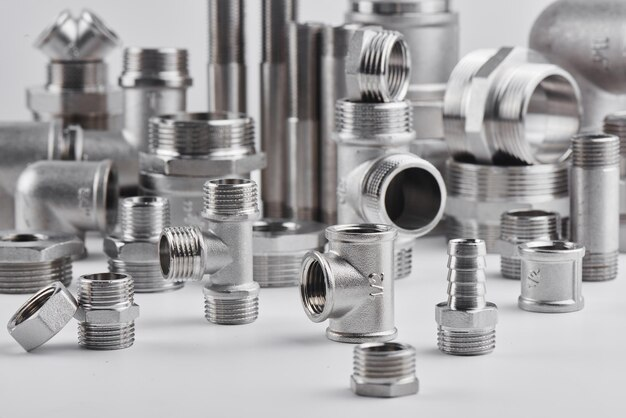Want to change or upgrade your bathroom and kitchen fittings?
Are you curious about the essential components that keep your plumbing system running smoothly?
Then you have come to the right place!
We have a basic guide to help you choose the right fittings for all your plumbing needs in 2024.
Let’s dive into the details together.
Threaded Pipe Fittings:
Threaded pipe fittings are versatile components designed to join pipes together or connect them to fixtures and appliances.
They come in various materials, sizes, types, and configurations, each serving a unique purpose in plumbing installations.
Let’s delve deeper into the essential aspects of threaded pipe fittings:
Material Selection:
- Stainless Steel:
Renowned for its exceptional durability, resistance to corrosion, and longevity, stainless steel threaded pipe fittings are ideal for indoor and outdoor applications. They withstand harsh environments and are suitable for various fluids, including water, gases, and chemicals.
- Brass:
Brass threaded fittings offer excellent corrosion resistance, making them well-suited for plumbing systems exposed to moisture and chemicals. They also provide good thermal conductivity, making them suitable for hot water applications.
- PVC (Polyvinyl Chloride):
PVC threaded fittings are lightweight, cost-effective, and resistant to corrosion and chemical damage. They are commonly used in non-corrosive environments and are ideal for cold-water plumbing systems.
Types of Fittings:
- Elbows:
Elbow fittings, typically available in 45-degree and 90-degree angles, allow for changes in the direction of pipes. They are essential for navigating around obstacles and creating bends in plumbing layouts.
- Tees:
Tee fittings enable the branching of pipes, connecting multiple pipelines or fixtures. They come in various configurations, including equal tees and reducing tees, to accommodate different flow requirements.
- Couplings:
Coupling fittings connect two pipes of the same diameter, providing a straight, continuous connection. They are essential for extending pipe lengths or repairing damaged sections.
- Nipples:
Nipple fittings are short threaded pipes used to extend or connect fittings. They are available in various lengths and diameters to suit specific plumbing needs.
Thread Types:
Threaded pipe fittings feature different types of threads, such as NPT (National Pipe Thread) and BSP (British Standard Pipe).
Choosing fittings with compatible thread types is essential to ensure a secure and leak-proof connection between components.
Corrosion Resistance:
Corrosion resistance is critical, especially in plumbing systems exposed to moisture, chemicals, or harsh environments.
Opting for threaded pipe fittings with corrosion-resistant coatings or materials like stainless steel can enhance the longevity and reliability of your plumbing installations.
Budget and Quality:
While budget considerations are important, prioritize the quality and reliability of threaded pipe fittings to avoid costly repairs or replacements down the line.
Investing in high-quality fittings may incur initial expenses but can ultimately save you money by minimizing maintenance and ensuring long-term performance.
Application Considerations:
Selecting the right threaded pipe fittings involves considering the application and environmental factors to ensure optimal performance. Here’s what to keep in mind:
- Temperature:
Choose fittings that can withstand elevated temperatures in environments like water heaters or steam lines without compromising integrity.
- Pressure Ratings:
Ensure fittings can handle anticipated fluid pressures to avoid leaks or equipment damage, especially in high-pressure settings.
- Chemical Compatibility:
Verify compatibility with fluids to prevent corrosion or contamination, prioritizing materials like stainless steel or brass known for their resistance.
- Environmental Conditions:
Consider factors like moisture, humidity, or corrosive elements, opting for fittings with enhanced corrosion resistance for outdoor or humid environments.
- Installation Requirements:
Ensure ease of installation and compatibility with existing systems, prioritizing precision-engineered threads for leak-free connections.
Final Words
Shopping for threaded pipe fittings requires a thorough understanding of materials, sizes, types, threads, corrosion resistance, application requirements, and budget considerations.
By leveraging this guide, builders, renovators, and homeowners can make informed decisions and select the right fittings for their bathroom and kitchen plumbing projects in 2024.
Investing in high-quality threaded pipe fittings is essential for building resilient, leak-free plumbing systems that stand the test of time.









